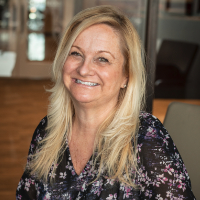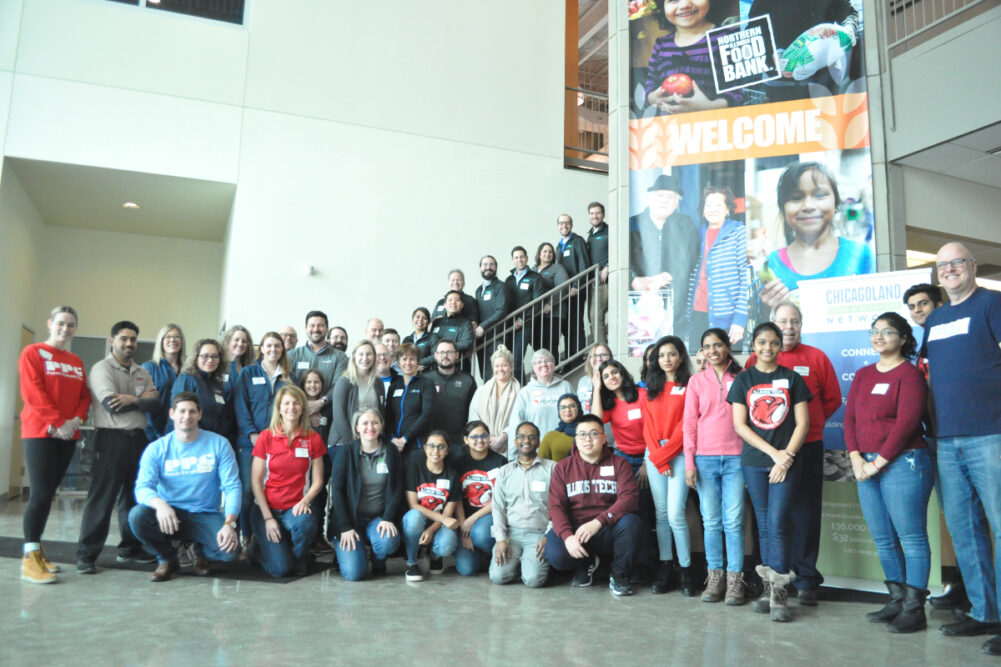 CHICAGO — Inspired by the saying “When you have more than you need, build a bigger table, not a higher fence,” the Chicagoland Food and Beverage Network (C.F.B.N.) has launched Bigger Table, a nonprofit organization that aims to bring together the area’s food and beverage industry to collaborate and deliver on a series of charitable and economic growth initiatives. By working together, Bigger Table believes it can work more effectively, have a bigger impact on the community and better engage employees and the communities it serves.
CHICAGO — Inspired by the saying “When you have more than you need, build a bigger table, not a higher fence,” the Chicagoland Food and Beverage Network (C.F.B.N.) has launched Bigger Table, a nonprofit organization that aims to bring together the area’s food and beverage industry to collaborate and deliver on a series of charitable and economic growth initiatives. By working together, Bigger Table believes it can work more effectively, have a bigger impact on the community and better engage employees and the communities it serves.
“Thousands of Illinois residents are food insecure, meaning they don’t have enough food every day, and the local food and beverage industry cares about addressing this issue,” said Alan Reed, executive director of C.F.B.N. and Bigger Table. “This nonprofit initiative demonstrates that by working together, we can formulate delicious, nutritious, high-quality products and deliver them to people who need them most.”
Food insecurity is found everywhere, and oftentimes it’s neighborhood families who just cannot make ends meet. Hunger placed No. 9 on The Intel Distillery’s annual list of the “top 10 topics” within U.S. food production in 2019. Contributing to this status was policy changes for SNAP recipients as well as the tightened work requirements for receiving benefits. Based in Chicago, The Intel Distillery is the food industry analysis arm of Bader Rutter, Milwaukee.
“Policy changes like this at the top impact what’s happening at food bank and family levels very quickly,” said Nick Praznowski, director of Bader Rutter The Intel Distillery. “Food companies, with their built-in resources, are in a unique position to help communities by providing hunger relief.”
Bader Rutter suggested the name Bigger Table and created a logo, some branding ideas and a simple web site. The first project — Bigger Table Hot Cocoa — took about six months from concept to packaged product ready for distribution through the Northern Illinois Food Bank, Geneva, Ill.
“Food companies, with their built-in resources, are in a unique position to help communities by providing hunger relief.” — Nick Praznowski, Bader Rutter The Intel Distillery
In total, 10 Chicago-area C.F.B.N. business members collaborated on formulating, preparing and packaging this low-sugar, high-protein beverage mix. All knowledge and materials were donated with zero cost incurred by the organizations, Mr. Reed said.
“This is no ordinary hot cocoa,” he said. “Delicious, nutrient-rich, no added sugar, with 7 grams of protein and 2 grams of fiber per serving, this cocoa will satisfy both taste and nutritional needs, as well as provide needed warmth during our cold winter.”
Forty-plus volunteers gathered at the food bank on Feb. 13 and labeled and boxed more than 10,000 cocoa packets, which were packaged earlier in the week at Proven Partners Group, Elgin, Ill., a blender and co-packer. ConnectFood, Chicago, provided food safety guidance and assisted with regulatory compliance.
“ConnectFood was involved in this project because both C.F.B.N. and our employees believe in making sure that safe healthy food is available for everyone,” said Matthew Botos, chief executive officer. “ConnectFood believes that no organizations should compete on the basis of food safety, and all contributors agree with this thought process. We were happy to work with all involved in making sure we have a safe food product.”
The other seven organization that made this project possible were Archer Daniels Midland Co., Chicago; CoreFX Ingredients, Chicago; Dairy Farmers of America (D.F.A.), Kansas City, with offices in Chicago; Edlong, Elk Grove Village, Ill.; Fona International, St. Charles, Ill.; Imbibe, Niles, Ill.; and Olam Cocoa, Willowbrook, Ill.
 “We knew this initial product would launch during winter,” said Andy Dratt, chief commercial officer at Imbibe, and chairman of Bigger Table. “That’s why we debuted with something warm and nourishing. Other products planned for the future include high-protein pancakes, smoothie mixes and snack bars.”
“We knew this initial product would launch during winter,” said Andy Dratt, chief commercial officer at Imbibe, and chairman of Bigger Table. “That’s why we debuted with something warm and nourishing. Other products planned for the future include high-protein pancakes, smoothie mixes and snack bars.”
About a year ago, several C.F.B.N. members expressed interest in how to collaborate to solve real issues in the community.
“To our knowledge, this is the first time any industry group has collaborated in this way,” said Brett Lutz, vice-president of global communications for ADM. “We think this is only the beginning of the impact we can make.”
ADM supplied the soy protein and fiber. The company’s culinary and food science teams worked with collaborating teams to take a starter formulation and improve upon it with ingredients supplied by the collective organizations.
CoreFX donated sugar-free coconut oil powder, a key component of the hot cocoa mix.
“It is healthful fat,” said Denis Neville, chief executive officer, CoreFX Ingredients. “We pushed hard to ensure that this was a nutritious beverage. We collaborated with ingredient colleagues to minimize carbs, particularly added sugars, and maximize fats and proteins to create a very tasty beverage.”
Imbibe, a beverage development company, donated a proprietary stevia blend for the product.
 “There is so much food waste in America, and while there are established outlets for extra food to be donated when in finished form, there has never been a way for ingredient companies to donate extra, near end of shelf life, or un-needed ingredients,” Mr. Dratt said. “We think we’re onto something big here and hope that by providing delicious, nutrient-rich products we can make an impact on underserved communities in a sustainable way.”
“There is so much food waste in America, and while there are established outlets for extra food to be donated when in finished form, there has never been a way for ingredient companies to donate extra, near end of shelf life, or un-needed ingredients,” Mr. Dratt said. “We think we’re onto something big here and hope that by providing delicious, nutrient-rich products we can make an impact on underserved communities in a sustainable way.”
Olam provided the cocoa, while D.F.A. donated the nonfat dry milk. Both are key ingredients to the drink mix. The N.F.D.M. delivers the protein content, as well as contributes to the creaminess of the prepared hot cocoa beverage.
“Dairy is a building block ingredient that provides protein and vitamins important to everyday nutrition, and we are proud to provide dairy ingredients that can aid so many,” said Carol Willenbring, vice-president of marketing and research and development with D.F.A.’s ingredient solutions department.
Laurette Rondenet, president and chief executive officer at Edlong, said, “The C.F.B.N. is closely aligned with the pulse of the food industry. It connects category leaders with one another, provides education on key topics and promotes our region as a hub for innovation. Bigger Table supports our company mission to ‘enrich the lives of those we touch,’ especially as it relates to food, nutrition and health.”
Providing nutrition to those in need through food banks is no longer limited to consumer packaged goods companies. The C.F.B.N. showed how the food manufacturing industry can participate.
“Companies that often work together, or at times compete in an industry, can come together and find solutions using their networks,” Ms. Willenbring said. “The power of C.F.B.N. is in harnessing the reach of all those they are affiliated with.”
 This is exemplified in how food scientists from Fona and Edlong, both flavor companies, worked together to develop the flavor system that was used in the hot cocoa.
This is exemplified in how food scientists from Fona and Edlong, both flavor companies, worked together to develop the flavor system that was used in the hot cocoa.
“Given the fact that the cocoa formulation had the addition of protein and fiber and was no sugar added created some inherent taste challenges,” said Lisa Demme, market director at Fona. “These challenges were addressed through the addition of a creamy milk chocolate flavor with some toasted marshmallow notes.”
Formulating and packaging the product was just one step. Branding was equally important.
“Branded products lend greater dignity to food bank donations,” said Dennis Ryan, executive creative director for Bader Rutter. “Not only do the recipients want good food, they appreciate when it comes in a nice package.”
Mr. Lutz said, “We’ve learned a lot in this process. In 2020 we’ll be venturing into new nutritious products that can create an even bigger table to serve this community we call home.”





